Booted From the Army, He Spiraled. Now He Works to Solve the Veteran Homelessness Crisis.
On a foggy December morning, Dennis Johnson parks his Toyota Tacoma beneath an overpass in downtown Oakland, California. To his left is a homeless encampment so dense it spills off the sidewalk and into the streets.
To his right is the Oakland Veterans Affairs Outpatient Clinic, and outside the clinic, a homeless veteran—in his 80s, Johnson says—sitting on a bench, on top of a torn gray sleeping bag. The man’s hooded sweatshirt pools around his withered frame.
Johnson, an outreach coordinator for a nonprofit that finds housing for homeless vets, crouches next to the bench to talk to the veteran and notices his puffy black eye.
“Who hit you in the eye?” Johnson asks.
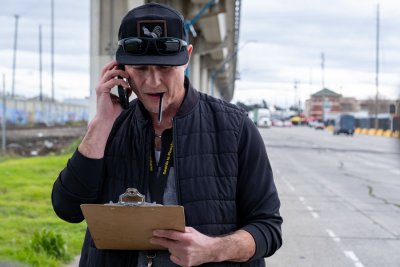
Johnson holds a clipboard and a pen between his teeth as he reaches out to his colleagues at Swords to Plowshares. He’s checking the eligibility for services of a veteran he recently encountered on the street, hoping to get him inside today.
The veteran—he’ll be L.W. in this article to protect his identity—mumbles an answer and wipes his runny nose. Johnson has seen him before and knows this is not his first black eye. The last time he got one, L.W., who served as a paratrooper in the 101st Airborne during the Vietnam War, suffered a shattered socket.
L.W. usually doesn’t like to be nudged about housing, but maybe, Johnson thinks, this latest beating will have changed his mind.
He hands L.W. a cigarette.
“Wanna get out of here? Wanna get your own spot?” Johnson asks, pointing to a six-story building across the street that houses formerly homeless veterans and likely has an apartment open.
“No, no,” L.W. says. “I’m not in no hurry.”
A Critical Need
Homeless veterans make up only a small fraction of America’s homeless population, and they have been a priority in efforts to house the homeless. Since 2019, Congress has committed billions of dollars in resources to end veteran homelessness, and the number of unhoused veterans, who make up 8% of the homeless nationwide, has been cut almost in half since then, though last year saw a 7.4% uptick in numbers.
But the proportion of homeless veterans living outdoors has increased. California, in particular, has more homeless veterans lingering on the street than any other state. More than 7,400 veterans live outside. Add in another 3,100 other veterans who live in shelters or temporary housing, and that’s 10,500, or almost one-third of all homeless veterans in the country.
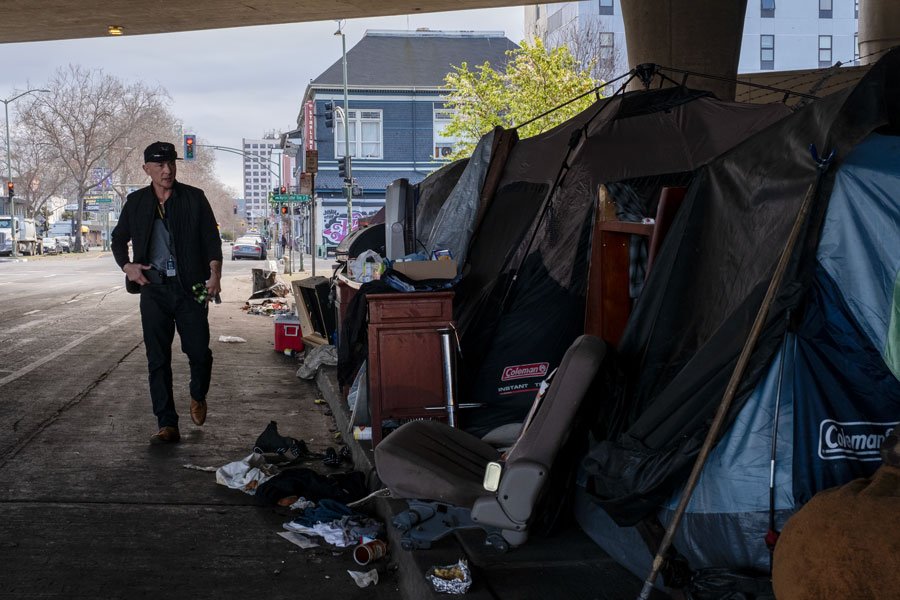
Johnson parks his van beside an encampment nestled under a freeway, calling out in search of unhoused veterans to offer assistance with social services and transitional housing.
A severe shortage of affordable housing and the tremendous cost of living in California are partly to blame. But it’s estimated that more than half of homeless veterans suffer from a mental illness, and 70% are affected by substance use disorder; often the two groups overlap. For those veterans, if outreach, supportive housing, and a veteran’s readiness for change don’t align, homelessness often remains the default.
California Gov. Gavin Newsom’s office, asked about the governor’s efforts to decrease the number of homeless veterans, pointed The War Horse to a website that outlines how Newsom has expanded supportive housing and residential treatment beds for homeless people with behavioral health issues. The office did not respond to our request for an interview. On March 5, Californians voted to narrowly approve a $6.4 billion mental health bond that would include $1 billion to improve and expand supportive housing and treatment options for homeless veterans, with a specific focus on the most vulnerable.
Across the country, more than 80 communities and three states have achieved an “effective end” to veteran homelessness, meaning every unhoused veteran is accounted for and can swiftly move into permanent housing. Riverside, a city in southern California, is one of those communities. In the state as a whole, the population of homeless veterans has decreased by more than 30% in the last 13 years.
Still, the total number of unhoused vets has remained between 10,000 and 12,000 for most of the last six years.
Shawn Liu, director of communications for the Veterans Administration’s homeless programs office, said that ending veteran homelessness relies heavily on reliable outreach workers, like Johnson. “They know everybody by name, they’re able to provide veterans shelter whenever they want it as soon as possible,” he said, adding that ultimately those outreach workers also stick with veterans until they’ve found permanent housing.
Award-Winning Journalism in Your Inbox
But not all California communities have enough outreach workers. For instance, a 2020 RAND Corporation study found a critical need in Los Angeles for more outreach to homeless veterans. In 2019, when the study began, the VA’s outreach team for the Los Angeles area was made up of five people serving all of Los Angeles County and surrounding counties. That number has since increased to 11 people, according to a VA spokesperson. A few other community-based organizations also provide outreach teams, and the most recent “point in time count” indicated that Los Angeles has more than 3,800 homeless veterans, a number that’s remained steady for the last several years.
“I would say the VA isn’t really doing their fair share of outreach. They’re relying so much on these other partners, who may or may not be adequately trained to really meet the needs of the veterans,” says Sarah Hunter, director of RAND’s Center on Housing and Homelessness.
‘I’m Where I’m Supposed to Be’
It’s still dark out, and 18-year-old Dennis Johnson is standing in the chill of an Oakland morning, in front of his mom’s two-chair hair salon, adorned with art from her native Korea. His mother is crying. And pulling up to the curb is a six-foot-something sergeant, who towers over Johnson and will officially hand the teenager with earnest brown eyes over to the U.S. Army.
It is May 2, 1989. Fear knots in Johnson’s throat. Sadness, too, as he thinks about his mom. But once inside the sergeant’s car and en route to basic training, he puffs up. I’m gonna kick ass for her, he decides.
Johnson is a natural catch for the Army, pedigree and hardship bundled together in its favor. He was born on a military base in South Korea to an American tank commander who took a bullet in the hip during Vietnam and a Korean woman who worked at a PX and caught his father’s eye.
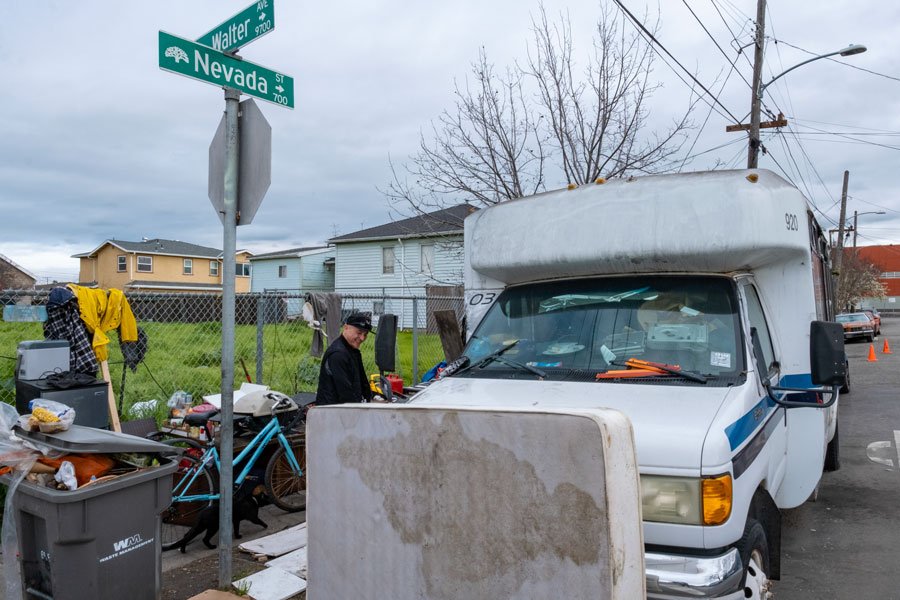
Johnson stands outside a converted bus serving as a makeshift home, engaging in conversation with a potential client.
As a child, Johnson said, his dad was tough, a man’s man, and because Johnson wasn’t a natural “alpha male,” the two were never close. He recalled that when he was in elementary school, his dad’s drinking escalated, and his parents split up and ended up living in different states. He enrolled in an alternative school in northern California, but spent the bulk of his time partying, often hanging with homeless people near a train station, “because they were the ones buying the alcohol,” Johnson would later say.
He and his mother lived in her hair salon—he had a small bed and a black-and-white TV in the back room. At night, she’d pull down the shades and sleep on the floor near the salon chairs. When a high school physical education teacher suggested he join the Army, Johnson jumped at it, hoping to win his dad’s approval and help his mother financially.
One day, several weeks into basic training, Johnson was buffing the barracks floors, getting them to that perfect, even gleam, and it hit him—I’m where I’m supposed to be. He was a proud soldier, confident in whatever lay ahead.
Two years later, though, the Army booted him. He got on a bus heading south on Interstate 5, from Fort Lewis in Washington State back to Oakland, with a duffel bag—and shame almost too crippling to bear.
An unraveling followed that lasted decades, and Johnson wound up homeless.
Lots of Vouchers, Many Unused
Many veterans who wind up homeless have, like Johnson, been discharged from the military before their full service commitment, due to poor conduct. Johnson meets a lot of veterans who received an “other than honorable discharge,” as punishment for behavior on active duty, or else were dishonorably discharged, if they’ve been court-martialed for a crime.
Often referred to as “bad paper,” these discharges can interfere with a veteran’s ability to receive benefits and health care. One veteran that Johnson, on his rounds as an outreach worker, found living in Oakland beneath ripped tarps and chopping up shipping pallets for firewood, only lasted nine days in boot camp before getting kicked out for being involved in a fight. “We all make bonehead mistakes,” Johnson said after meeting the man.
There is temporary housing assistance available for that veteran to get him off the street, though his short stint in boot camp and discharge status may prevent him from participating in the HUD-VA. supportive housing program (HUD-VASH), which has provided housing vouchers and supportive services for thousands of homeless veterans every year since its establishment in 2008.
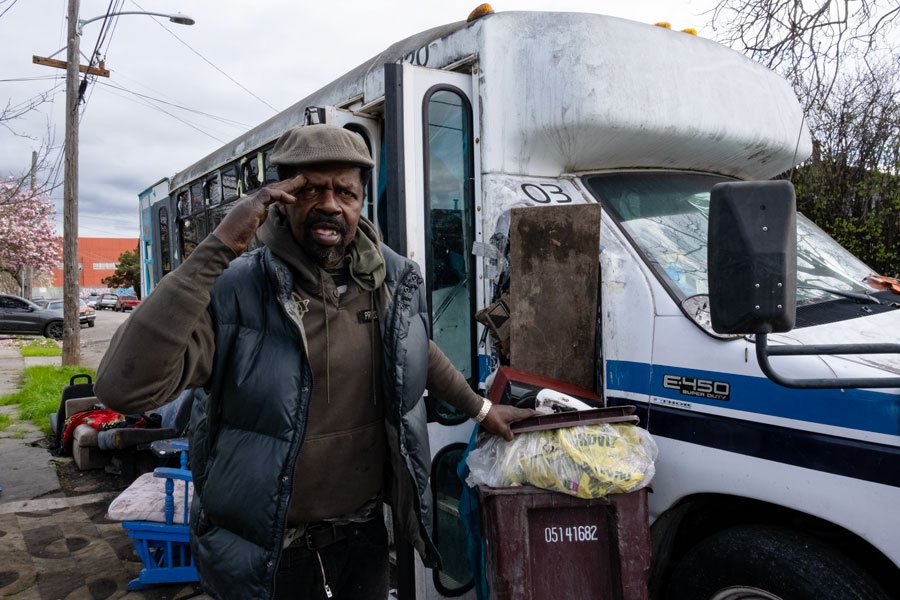
Lester Stanfield, an unhoused veteran, salutes as he poses for a portrait in front of his home parked on a street in Oakland, California. Stanfield lives in a converted bus with his wife and black cat named Catastrophe.
Eligibility criteria for HUD-VASH were loosened in 2021 to get more homeless vets off the street, and VA encourages all homeless veterans who don’t have a dishonorable discharge to apply. To keep up with California’s high rents, the HUD-VASH program also has enhanced the government subsidy. In San Francisco, for instance, the voucher will cover a one-bedroom apartment with rent up to $3,500, with veterans pitching in 30% of their monthly income toward rent.
Still, Sarah Hunter, of RAND, said finding landlords who accept vouchers can take months, and the vouchers generally expire after 120 days, though some city housing authorities grant extensions.
At the end of 2023, more than 11,500 HUD-VASH vouchers were allocated in the counties of Los Angeles, San Francisco, and Alameda, where Oakland is located, but only 60% were in use. In Los Angeles, nearly half the vouchers were not being used.
Hunter was a co-author of the 2020 RAND Corporation study that followed 26 unhoused veterans in Los Angeles and found that only three obtained permanent supportive housing within that year. Fourteen were placed in transitional or emergency housing, some of which was made available during the pandemic, but the authors noted that it was likely that many might cycle back to the streets because temporary shelter doesn’t guarantee a placement in a permanent housing.
One female veteran in the study said that after tumbling in and out of housing, and struggling to keep up an income, she had given up.
“I’m done fighting the system to get thrown off back down in the gutter. So now it’s time to embrace the gutter, because at least it’s fucking home,” she said.
‘The Most Devastating Day of My Life’
When Johnson arrived at Fort Leonard Wood in Missouri for basic training, he settled right in. At 18, he was still in many ways a kid, who idolized his dad and would dig through his military memorabilia—sliding his father’s helmet on his head, marveling at old smoke grenades and memorizing the musty scent of his dad’s worn uniform.
He proudly served as guidon bearer, standing in front of the unit with the commander, for all of basic training, he said. But he still felt a need “to prove myself,” and that meant doing whatever Army guys did: When his buddies headed for the bar, so did he.
After basic training, stationed at Fort Lewis in Washington, the drinking got him in trouble—sneaking his girlfriend into the barracks, a fight with a staff duty officer. But it was an accident during his Gulf War deployment in 1990 that sent his military career into freefall.
He was leaving Kuwait City as part of a convoy transporting tanks. Drivers in the convoy were racing through the desert, messing around, and Johnson was driving an eight-ton truck he barely knew how to operate. When the truck in front of him stopped suddenly, he couldn’t pump the brakes fast enough. His battle buddy, a revered sergeant who was sitting next to Johnson, had his legs on the console, and upon impact, his lower half crumpled into the back window. The sergeant had to be medevaced out. He ultimately recovered, Johnson said.
“I watched [him] in slow motion get hurt really bad,” Johnson recalled. Some soldiers in his unit blamed him for the accident. But drinking, he found, hushed the memory. “I just took it to another level, where I went deep into alcoholism,” he said. “I found peace in it.”
Johnson’s missteps accumulated, including a drunken night spent driving donuts on the parade field.
In 1991, he received orders that he was heading to Germany. As a World War II history buff, this was “a dream, ” he said, a new part of the world, far from Fort Lewis, where he kept landing in trouble.
He gathered his crew for a goodbye party. They drank, he drove, and before the night was over he had rolled his truck down a hill. The Army did not send him to Germany. They discharged him and handed him a bus ticket.
“It was the most devastating day of my life,” he said. “I had to explain to my dad over the phone that I got kicked out on a general discharge, and I had to explain to my mother why am I home.”
On the ride back to the Bay Area, at a transfer spot, he saw a young recruit with buzzed hair grab his duffel and get on the bus heading north, presumably to Fort Lewis. Johnson, heading south, said it broke him.
He assumed that because he was not discharged honorably, VA didn’t owe him a thing, so he didn’t think to seek counseling for his alcohol abuse and mental health issues or help finding housing.
“I was embarrassed I wouldn’t be VA eligible,” he remembers.
Swagger, Eagerness, and Empathy
With more than 1,500 unhoused veterans in the Bay Area, the need is constant: a veteran sick on the streets, a veteran sleeping in a library’s shrubbery, a veteran facing eviction—a problem Johnson is running into more frequently as pandemic-era eviction moratoriums lift and $1 billion in federal money earmarked in part for emergency housing for unhoused veterans has largely dried up. (Finding money to pay high energy bills is also an ongoing issue for low-income and formerly homeless veterans.)
Now Johnson is in his early 50s, with a clean-shaven head that’s usually topped by a ball cap, his sunglasses resting on the brim. He works at Swords to Plowshares, a Bay Area nonprofit that supports unhoused veterans with housing, employment and other services, overseeing three other outreach workers. A couple of times a month, when he’s on the streets, he works encampments with hummingbird energy, relying on a fluid algorithm of swagger, eagerness, and empathy, depending on the veteran.
When, on a hot October day, a young, former infantry soldier living in a bus-sized RV near a Home Depot greets Johnson with skeptical, droopy eyes, Johnson extends a firm handshake, smacks his clipboard upon learning he’s a veteran, and smiles. “I’ve been looking for you!” he says. (The War Horse is only identifying veterans who have agreed to have their names used.)
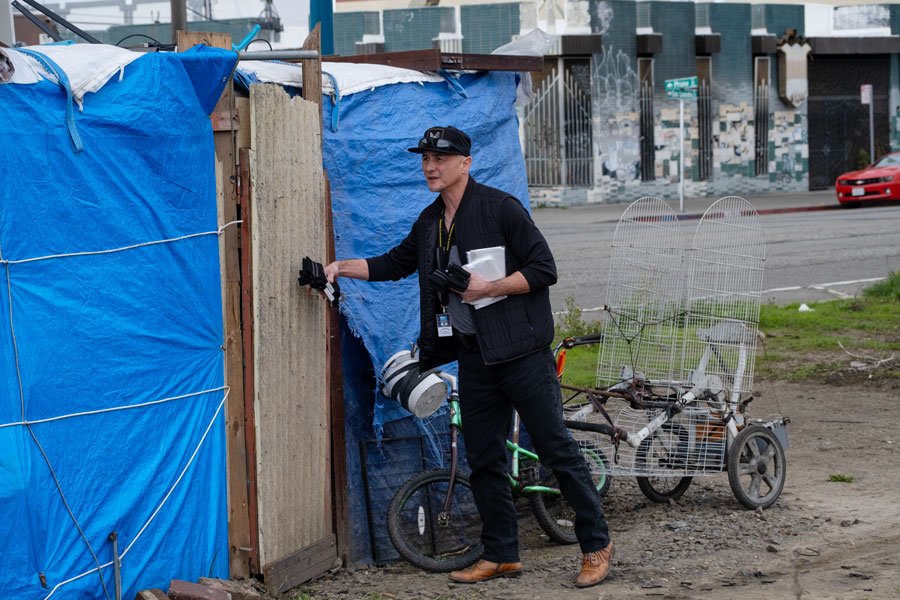
At an encampment under the BART train tracks in Oakland, Johnson searches for veterans in need, carrying plastic ponchos and pairs of black socks.
When an unhoused veteran erupts into a curse-fueled rant during a phone call, as loud and steady as a jackhammer because he’s lost his social security income—“I’ve been digging out of goddam barrels for fucking nine months. I don’t fucking steal but I’m about to rob a fucking bank,”—Johnson just nods. Listening tends to deflate rage.
“All right,” he says, calmly. “Let’s make it right today.”
If Johnson is searching for veterans he’s never met, he knows to look for hats that sit squarely on the head, brim lowered, and back raised—as the military prefers. An American flag outside an encampment is also a clue.
And if he senses unfriendly territory, he backs off, but not before passing out water or socks or hygiene kits because, as he sees it, someone might know a veteran in need, and it’s good public relations to bound in with supplies.
Believing in a Better Future
For years, Johnson lived a nomadic existence, coasting on a bout of odd jobs—valet in Southern California, construction worker in the Bay Area—before winding up on the street for about a year in 2000.
He’d walk the Bay Area’s steep hills to stay warm at night. Come daybreak, he’d rest for a few hours. It was “a good day,” he recalled, if he swiped beer from a store without getting caught.
He isolated, relying on survival skills learned in the military.
“Being out in the streets for a couple of weeks will change the way you see things,” he said. “A lot of times you’re staying intoxicated because that’s your comfort zone—I’m not afraid, nobody’s gonna hurt me, everybody loves me.”
In his early 40s, though, Johnson developed “the shakes” from alcohol withdrawal. It frightened him.
He knew he needed help. And while his whole life he had “fought the concept of God,” he said, believing in a better future required a leap toward a higher power. He recalled one day kneeling down and praying. “I started crying like a little baby and I went into detox that day,” he said. “I knew that if I could sit on my hands and just stay sober, I’d have a whole new life.”
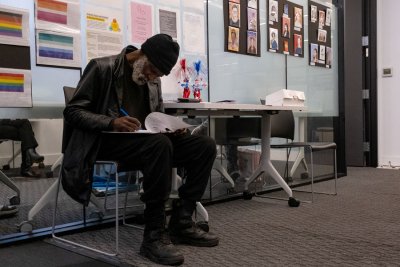
At the Swords to Plowshares office, Vincent Smith diligently completes paperwork to access social services. Having served in the military for three years with an honorable discharge, Smith faced homelessness following a family dispute after his father died and his sister’s decided to sell their family home.
While in detox, he heard about a transitional housing site that had gained the nickname “pack and stack”—more than 20 men scrunched into a three-bedroom house, navigating their new sobriety. He paid $360 in rent, the cash assistance California provides to indigent people. While there, Johnson befriended a tall, charismatic man named Sanford, who was trying to recover from a crack addiction.
Sanford mentioned that he was a veteran, and Johnson said that he, too, had served.
One day, after an Alcoholics Anonymous meeting, Sanford rode the bus with Johnson to downtown Oakland, where a social worker told him that, as a combat veteran, he’d been eligible for VA benefits and housing for more than two decades.
Soon, Johnson moved into Operation Dignity, an orange and teal transitional housing complex in Oakland for formerly homeless veterans. To stay sober, he’d walk six miles to the gym every day, coming back with orange streaks on his shirt from oranges he’d pluck from trees in people’s front yards and eat. That, he said, was the extent of his troublemaking.
About 9 years ago, Swords to Plowshares hired Johnson to provide support at a short-term, transitional housing site that didn’t require sobriety or participation in programming. Tramecia Garner, chief operating officer and housing director of the nonprofit, recalled his vibe at the shelter as “passionate.” He was, she thought, just the guy to fill the hardest job: outreach.
Homeless and Struggling
More than 10 years ago, the VA adopted the “Housing First” model, which prioritizes permanent supportive housing without conditions like sobriety, and includes supportive services. A VA analysis of existing research on Housing First indicated that the approach has increased housing stability; however, veterans can still lose housing for behavior that persistently violates the housing lease.
Garner, of Swords to Plowshares, said that permanent supportive housing varies in quality. In a development with layers of private, state, or city funding, supportive services will often include case managers, peer support, and mental health care on site. Other, less substantially funded housing often does not. “Folks don’t fully understand that because it’s supportive housing, it doesn’t guarantee that you have robust services,” she says, and without it, veterans can struggle.
The VA recently announced that it had placed more than 46,500 veterans into permanent housing in 2023, exceeding its goal of 38,000, and that nearly all those placed in permanent housing remained housed. In 2024, VA aims to house 41,000 homeless veterans. The agency’s research shows that about 10% of housed veterans return to homelessness within a year of being housed, and 17% within two years, though that only captures veterans whom VA can keep track of through a veteran’s continued use of their homeless or health care services while out on the street.
Studies suggest that homeless veterans who live outdoors are more likely to have experienced combat exposure or military sexual trauma, and to have received a diagnosis of post-traumatic stress. While traditionally, unsheltered veterans have been older and white, the population is becoming younger and increasingly Hispanic.
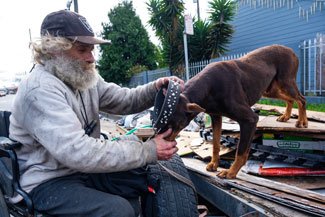
In the same unhoused community near Stanfield’s bus, an unhoused veteran named Dirt, who uses a wheelchair, lives in a vehicle with his dog—Big Red. Dirt is fixing his dog’s collar to let him roam on the street. Although Johnson offers Dirt a hotel room, he declines it, saying that he prefers to stay with his friends.
Remaining unhoused can worsen chronic pain and depression in part because of poor access to health care and can make surviving serious illnesses, like cancer, less likely. On top of that, more than half of homeless veterans are older than 55, and some age on the streets to the point that they’re unable to take basic care of themselves. A few years ago, Johnson met a veteran in a wheelchair who’d lived outside in San Francisco for so long that bed bugs swarmed his body, and his socks stuck like skin to his feet, which looked mummified.
In his outreach work, Johnson dreads meeting homeless veterans who were reservists or in the National Guard. His job is to help veterans, and these veterans are eligible for homeless programs VA offers only if the president or Congress activated their unit. “A lot of those guys don’t know, they have hope or they think that they were federally activated,” Johnson said, citing, as an example, a guardsman who was only activated to fight fires by the governor of Oregon, not the federal government, and so was not eligible for the resources.
On the flip side, some veterans who are eligible for VA housing and benefits resist out of pride or the belief that they’ve been mistreated by the country they served.
A female veteran, tearing up as she talked, told The War Horse that homeless veterans often carry heavy trauma and need to “feel loved and cared for,” be that through VA or another community organization, because without that, she said, they’ll fall back onto whatever “behaviors and patterns” offer comfort. “Sometimes they’re negative behaviors,” she said.
In early December, Johnson learned that L.W, the veteran outside the Oakland VA clinic, had been diagnosed with early-stage dementia, meaning his HUD-VASH voucher could no longer be used in the apartment across the street and he would likely require assisted living.
Sensing a Win
When Johnson hooks veterans into housing, he tries to stick with them—texting and checking in. One of his veterans jokes that it’s like Johnson has a “tracking device” on him.
On a recent winter morning, Johnson parks his truck in downtown San Francisco and briskly walks through the rain into a homeless outreach event that’s packed an indoor arena with homeless service organizations. Johnson’s manning a table for Swords to Plowshares.
A baby-faced Air Force veteran stops to talk with him. He looks to be in his 20s, and wears an olive green sweater with sleeves pushed up to reveal pale, thick forearms. Johnson asks about a jagged scab that splits his forehead beneath his buzz-cut hair. He says that he recently got out of jail, is without housing, and was robbed and hit with a metal pipe on the street.
The veteran speaks in a respectful staccato, likely shaped by addressing his chain of command. He winces as he shakes Johnson’s hand—he’ll admit later that his hand was broken. Johnson recognizes great potential in front of him and animates into a salesman for permanent, supportive housing opportunities.
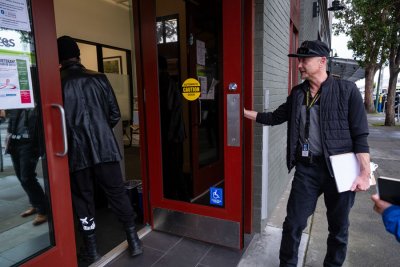
Returning to the Swords to Plowshares office, Johnson guides Vincent Smith through the intake paperwork process. “All I can offer you is trust, OK, brother?” Johnson assures. “I appreciate it,” Smith responds gratefully.
“Why don’t you work with veterans?” Johnson asks, before telling the young man about a job opening at Swords to Plowshares.
“Is there upward mobility there?” the veteran asks. And with that earnest, upstanding question, Johnson senses a win.
“He had his head on his shoulders,” Johnson says later. “He had respect for the military. I could see that right off the bat. The way he shook my hand, even with a broken hand.”
Johnson tries to not take work home, he says, especially since becoming a father to a seven-year-old daughter. But a fellow outreach worker, Dirk Williams, who is standing beside Johnson at the outreach event in the arena, says that Johnson is “intense.”
“He’s seen a lot of people get better and even more people fall apart,” Williams says. “And the hardest part is when they fall apart. I’ve had a few valuable lessons in the short time I’ve worked here about letting go of the results. And he’s still working on that sometimes.”
The stress of Johnson’s job manifests in odd ways: For example, his left eye swells. “When I get stressed out at work,” he said, “it will blow up and it’s like having a hair in my eye.”
Part of that stress comes from wishing he could enact policy and magic-wand some of his solutions. Here’s one: subsidized mobile home parks. Rather than boxing formerly homeless veterans into apartments, Johnson said, the parks would offer open space and community, things many of the veterans he encounters prefer. “In other words, stop wasting time paying $2,500 [in rent] when you can subsidize a mobile home for maybe $800,” he said.
Back in the arena, the young Air Force veteran leaves with the cell phone numbers of both Dennis Johnson and Dirk Williams and a Swords to Plowshares brochure. His phone was stolen, he says, but he still promises to follow up.
Then he heads outside and disappears.
‘This is Gonna Be Good’
In February, on a day with swollen, gray clouds about to pop, Johnson is feeling optimistic. “Outreach during the rain is better,” he says. “People are hunkered down and more open to housing.”
An East Oakland church alerted him to some veterans living in an encampment. He pulls up to a small white bus with blue stripes, duct-taped windows, and a flat tire.
“Anyone home?” he shouts.
An elderly man in a black leather jacket and a beanie steps out, and the two shake hands and pull into a one-arm hug.
“Were you active duty?” Johnson asks.
He’s a veteran, all right. Army. Vincent Wayne Smith, named after John Wayne, he says, but walking with his own distinctive gait from back pain that radiates into his ankles.
“If you want to work with me, I’ll work with you,” Johnson says. “I’ll take you off the streets right now and put you in a hotel.”
Another Army veteran wearing an olive green Army sweatshirt wobbles out of the bus. Lester Stanfield. Johnson knows him well because he often tells Johnson he’s ready for housing but ultimately decides to stay in his bus.
“I’m going to harass you,” Johnson jokes with Stanfield. “I’m gonna get you.”
“No man left behind,” Stanfield says with a smile, before heading back inside. “God bless you for checking on me.”
Smith, though, agrees to go with Johnson back to his office to start the intake process.
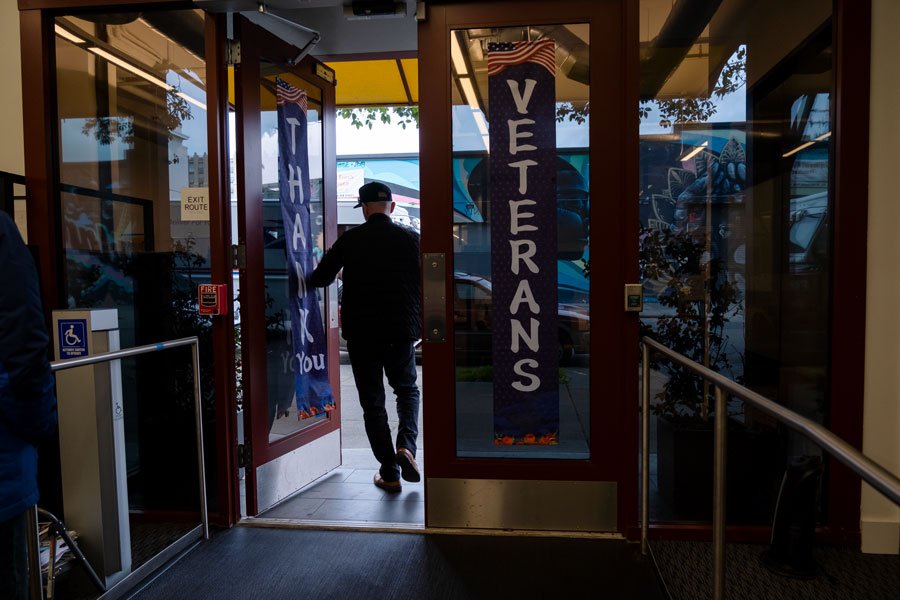
Leaving the Swords to Plowshares office in Oakland, California, Johnson heads out to assist an unhoused veteran, Vincent Smith, who has agreed to accept services.
On the drive, he tells Johnson that he lived with his parents until they died and his sister sold the house. He began sleeping in his Ford Explorer.
When Smith talks about his military service, Johnson perks up at the mention of his honorable discharge and that he served as an infantry soldier—it means he has a good chance of qualifying for a service-connected disability that would provide him with income.
“This is gonna be good, Vincent,” Johnson says, reaching out to shake Smith’s hand while steering with the other.
Johnson rattles off all the things that Smith is likely to be eligible for, like living in a roomy house reserved for formerly homeless veterans on an old Naval base. The message: Stick with me, stick with me, stick with me.
Our Journalism Depends on Your Support
Smith talks about his basic training at Fort Leonard Wood, Missouri, his first duty station at Fort Lewis Washington, the time he spent deployed to Germany. Johnson doesn’t share how closely their journeys parallel, because he wants to let Smith talk, and today is about making things right, not just for Smith, but for himself. “I’m finishing my enlistment doing this,” he often says.
Johnson pulls up to his office and gets out of his truck. With Smith ahead of him and out of earshot, he slaps the parking meter and whispers excitedly: “We just changed this guy’s life and he doesn’t even know it.”
This War Horse investigation was reported by Anne Marshall-Chalmers, edited by Erica Goode, fact-checked by Jess Rohan, and copy-edited by Mitchell Hansen-Dewar. Abbie Bennett wrote the headlines. Yesica Prado contributed photos.





Comments are closed.